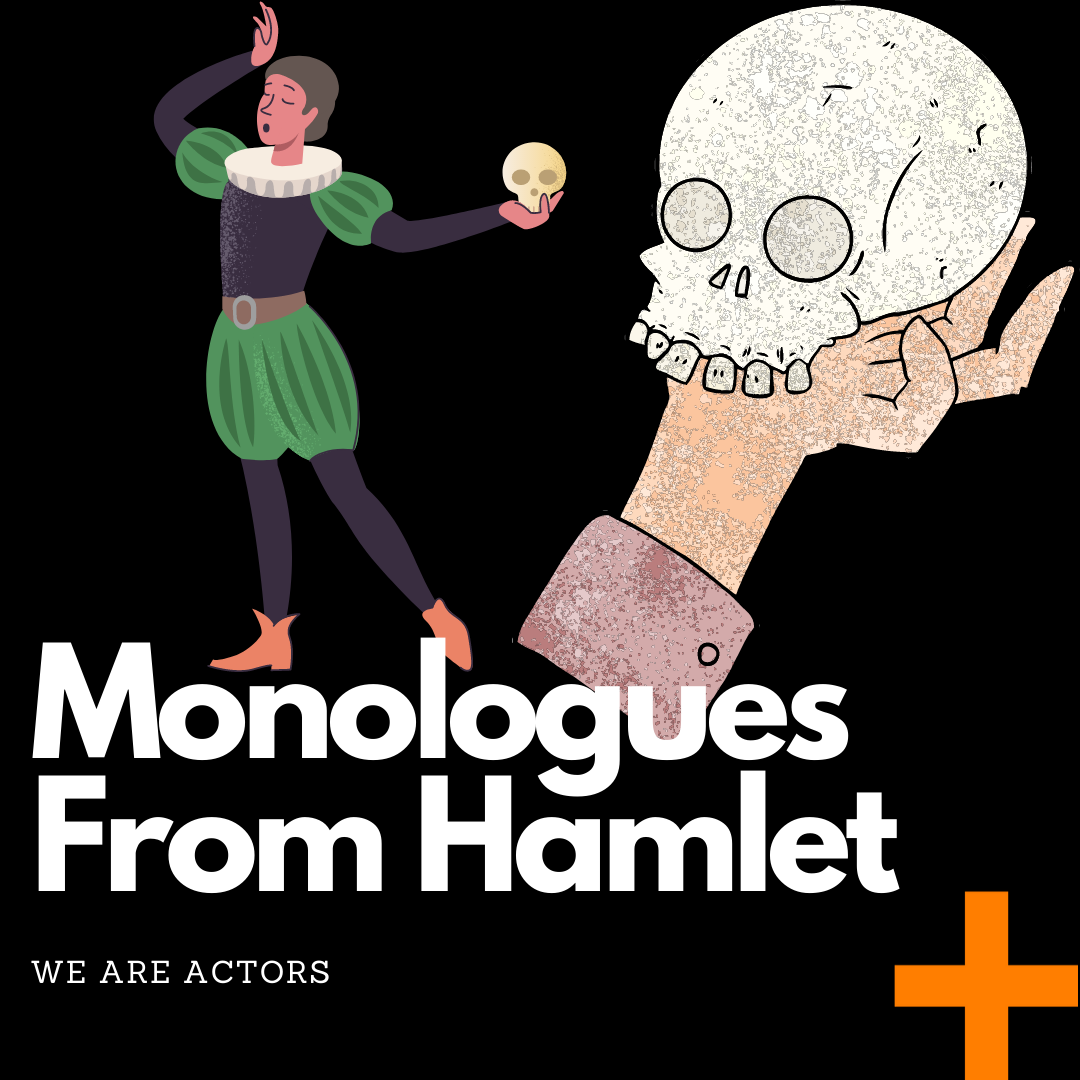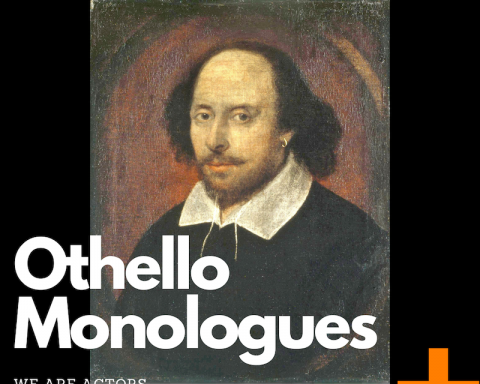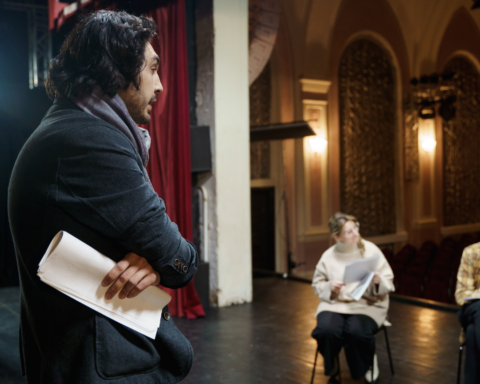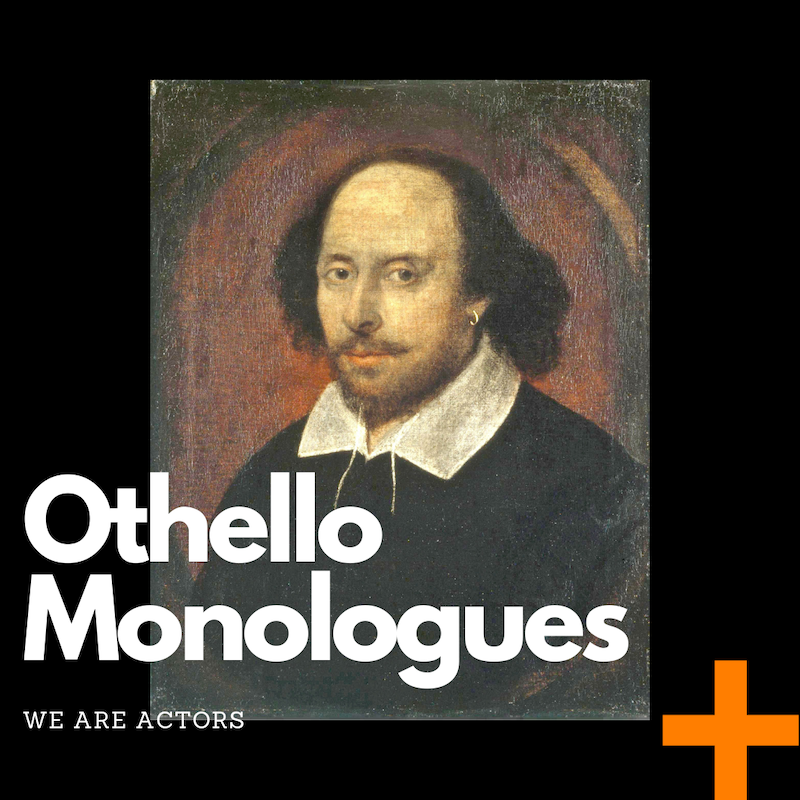
The Hamlet soliloquies.
The most popular play by the world’s best known playwright, contains the world’s most famous character from a play who has the most recognizable lines in the history of theater.
Here are all of Hamlet’s monologues, including everything from ‘To be, or not to be.’ To the lesser known ‘Since my dear soul was mistress of her choice
And could of men distinguish, her election
Hath seal’d thee for herself.’
Enjoy this list of Monologues From Hamlet!
- Act 1, Scene 2
O that this too too solid flesh would melt,
Thaw, and resolve itself into a dew!
Or that the Everlasting had not fix’d
His canon ‘gainst self-slaughter! O God! God!
How weary, stale, flat, and unprofitable
Seem to me all the uses of this world!
Fie on’t! ah, fie! ‘Tis an unweeded garden
That grows to seed; things rank and gross in nature
Possess it merely. That it should come to this!
But two months dead! Nay, not so much, not two.
So excellent a king, that was to this
Hyperion to a satyr; so loving to my mother
That he might not beteem the winds of heaven
Visit her face too roughly. Heaven and earth!
Must I remember? Why, she would hang on him
As if increase of appetite had grown
By what it fed on; and yet, within a month-
Let me not think on’t! Frailty, thy name is woman!-
A little month, or ere those shoes were old
With which she followed my poor father’s body
Like Niobe, all tears- why she, even she
(O God! a beast that wants discourse of reason
Would have mourn’d longer) married with my uncle;
My father’s brother, but no more like my father
Than I to Hercules. Within a month,
Ere yet the salt of most unrighteous tears
Had left the flushing in her galled eyes,
She married. O, most wicked speed, to post
With such dexterity to incestuous sheets!
It is not, nor it cannot come to good.
But break my heart, for I must hold my tongue!
2. Act 1, Scene 4
Ay, marry, is’t;But to my mind, though I am native here
And to the manner born, it is a custom
More honour’d in the breach than the observance.
This heavy-headed revel east and west
Makes us traduc’d and tax’d of other nations;
They clip us drunkards and with swinish phrase
Soil our addition; and indeed it takes
From our achievements, though perform’d at height,
The pith and marrow of our attribute.
So oft it chances in particular men
That, for some vicious mole of nature in them,
As in their birth,- wherein they are not guilty,
Since nature cannot choose his origin,-
By the o’ergrowth of some complexion,
Oft breaking down the pales and forts of reason,
Or by some habit that too much o’erleavens
The form of plausive manners, that these men
Carrying, I say, the stamp of one defect,
Being nature’s livery, or fortune’s star,
Their virtues else- be they as pure as grace,
As infinite as man may undergo-
Shall in the general censure take corruption
From that particular fault. The dram of e’il
Doth all the noble substance often dout To his own scandal.
3. Act 1, Scene 5
O all you host of heaven! O earth! What else?
And shall I couple hell? Hold, hold, my heart!
And you, my sinews, grow not instant old,
But bear me stiffly up. Remember thee?
Ay, thou poor ghost, while memory holds a seat
In this distracted globe. Remember thee?
Yea, from the table of my memory
I’ll wipe away all trivial fond records,
All saws of books, all forms, all pressures past
That youth and observation copied there,
And thy commandment all alone shall live
Within the book and volume of my brain,
Unmix’d with baser matter. Yes, by heaven!
O most pernicious woman!
O villain, villain, smiling, damned villain!
My tables! Meet it is I set it down
That one may smile, and smile, and be a villain
At least I am sure it may be so in Denmark. [Writes.]
So, uncle, there you are. Now to my word:
It is ‘Adieu, adieu! Remember me.’
I have sworn’t.
4. Act 2, Scene 2
I will tell you why. So shall my anticipation prevent your discovery, and your secrecy to the King and Queen moult no feather. I have of late- but wherefore I know not- lost all my mirth, forgone all custom of exercises; and indeed, it goes so heavily with my disposition that this goodly frame, the earth, seems to me a sterile promontory; this most excellent canopy, the air, look you, this brave o’erhanging firmament, this majestical roof fretted with golden fire- why, it appeareth no other thing to me than a foul and pestilent congregation of vapours. What a piece of work is a man! how noble in reason! how infinite in faculties! in form and moving how express and admirable! in action how like an angel! in apprehension how like a god! the beauty of the world, the paragon of animals! And yet to me what is this quintessence of dust? Man delights not me- no, nor woman neither, though by your smiling you seem to say so.
5. Act 2, Scene 2
O what a rogue and peasant slave am I!
Is it not monstrous that this player here,
But in a fiction, in a dream of passion,
Could force his soul so to his own conceit
That, from her working, all his visage wann’d,
Tears in his eyes, distraction in’s aspect,
A broken voice, and his whole function suiting
With forms to his conceit? And all for nothing!
For Hecuba!
What’s Hecuba to him, or he to Hecuba,
That he should weep for her? What would he do,
Had he the motive and the cue for passion
That I have? He would drown the stage with tears
And cleave the general ear with horrid speech;
Make mad the guilty and appal the free,
Confound the ignorant, and amaze indeed
The very faculties of eyes and ears.
Yet I,
A dull and muddy-mettled rascal, peak
Like John-a-dreams, unpregnant of my cause,
And can say nothing! No, not for a king,
Upon whose property and most dear life
A damn’d defeat was made. Am I a coward?
Who calls me villain? breaks my pate across?
Plucks off my beard and blows it in my face?
Tweaks me by th’ nose? gives me the lie i’ th’ throat
As deep as to the lungs? Who does me this, ha?
‘Swounds, I should take it! for it cannot be
But I am pigeon-liver’d and lack gall
To make oppression bitter, or ere this
I should have fatted all the region kites
With this slave’s offal. Bloody bawdy villain!
Remorseless, treacherous, lecherous, kindless villain!
O, vengeance!
Why, what an ass am I! This is most brave,
That I, the son of a dear father murther’d,
Prompted to my revenge by heaven and hell,
Must (like a whore) unpack my heart with words
And fall a-cursing like a very drab,
A scullion!
Fie upon’t! foh! About, my brain! Hum, I have heard
That guilty creatures, sitting at a play,
Have by the very cunning of the scene
Been struck so to the soul that presently
They have proclaim’d their malefactions;
For murther, though it have no tongue, will speak
With most miraculous organ, I’ll have these Players
Play something like the murther of my father
Before mine uncle. I’ll observe his looks;
I’ll tent him to the quick. If he but blench,
I know my course. The spirit that I have seen
May be a devil; and the devil hath power
T’ assume a pleasing shape; yea, and perhaps
Out of my weakness and my melancholy,
As he is very potent with such spirits,
Abuses me to damn me. I’ll have grounds
More relative than this. The play’s the thing
Wherein I’ll catch the conscience of the King.
[Exit]

Larry Moss | We Are Actors – We Are Actors Podcast
5. Act 3, Scene 1
To be, or not to be- that is the question:
Whether ’tis nobler in the mind to suffer
The slings and arrows of outrageous fortune
Or to take arms against a sea of troubles,
And by opposing end them. To die- to sleep-
No more; and by a sleep to say we end
The heartache, and the thousand natural shocks
That flesh is heir to. ‘Tis a consummation
Devoutly to be wish’d. To die- to sleep.
To sleep- perchance to dream: ay, there’s the rub!
For in that sleep of death what dreams may come
When we have shuffled off this mortal coil,
Must give us pause. There’s the respect
That makes calamity of so long life.
For who would bear the whips and scorns of time,
Th’ oppressor’s wrong, the proud man’s contumely,
The pangs of despis’d love, the law’s delay,
The insolence of office, and the spurns
That patient merit of th’ unworthy takes,
When he himself might his quietus make
With a bare bodkin? Who would these fardels bear,
To grunt and sweat under a weary life,
But that the dread of something after death-
The undiscover’d country, from whose bourn
No traveller returns- puzzles the will,
And makes us rather bear those ills we have
Than fly to others that we know not of?
Thus conscience does make cowards of us all,
And thus the native hue of resolution
Is sicklied o’er with the pale cast of thought,
And enterprises of great pith and moment
With this regard their currents turn awry
And lose the name of action.- Soft you now!
The fair Ophelia!- Nymph, in thy orisons
Be all my sins rememb’red.
6. Act 3, Scene 1
Hamlet. Get thee to a nunnery! Why wouldst thou be a breeder of sinners? I am myself indifferent honest, but yet I could accuse me of such things that it were better my mother had not borne me. I am very proud, revengeful, ambitious; with more offences at my beck than I have thoughts to put them in, imagination to give them shape, or time to act them in. What should such fellows as I do, crawling between earth and heaven? We are arrant knaves all; believe none of us. Go thy ways to a nunnery. Where’s your father?
Ophelia. At home, my lord.
Hamlet. Let the doors be shut upon him, that he may play the fool nowhere but in’s own house. Farewell.
Ophelia. O, help him, you sweet heavens!
Hamlet. If thou dost marry, I’ll give thee this plague for thy dowry: be thou as chaste as ice, as pure as snow, thou shalt not escape calumny. Get thee to a nunnery. Go, farewell. Or if thou wilt needs marry, marry a fool; for wise men know well enough what monsters you make of them. To a nunnery, go; and quickly too. Farewell.
Ophelia. O heavenly powers, restore him!
Hamlet. I have heard of your paintings too, well enough. God hath given you one face, and you make yourselves another. You jig, you amble, and you lisp; you nickname God’s creatures and make your wantonness your ignorance. Go to, I’ll no more on’t! it hath made me mad. I say, we will have no moe marriages. Those that are married already- all but one- shall live; the rest shall keep as they are. To a nunnery, go.
7. Act 3, Scene 2
Hamlet. Speak the speech, I pray you, as I pronounc’d it to you, trippingly on the tongue. But if you mouth it, as many of our players do, I had as live the town crier spoke my lines. Nor do not saw the air too much with your hand, thus, but use all gently; for in the very torrent, tempest, and (as I may say) whirlwind of your passion, you must acquire and beget a temperance that may give it smoothness. O, it offends me to the soul to hear a robustious periwig-pated fellow tear a passion to tatters, to very rags, to split the cars of the groundlings, who (for the most part) are capable of nothing but inexplicable dumb shows and noise. I would have such a fellow whipp’d for o’erdoing Termagant. It out-herods Herod. Pray you avoid it.
First Player. I warrant your honour.
Hamlet. Be not too tame neither; but let your own discretion be your tutor. Suit the action to the word, the word to the action; with this special observance, that you o’erstep not the modesty of nature: for anything so overdone is from the purpose of playing, whose end, both at the first and now, was and is, to hold, as ’twere, the mirror up to nature; to show Virtue her own feature, scorn her own image, and the very age and body of the time his form and pressure. Now this overdone, or come tardy off, though it make the unskilful laugh, cannot but make the judicious grieve; the censure of the which one must in your allowance o’erweigh a whole theatre of others. O, there be players that I have seen play, and heard others praise, and that highly (not to speak it profanely), that, neither having the accent of Christians, nor the gait of Christian, pagan, nor man, have so strutted and bellowed that I have thought some of Nature’s journeymen had made men, and not made them well, they imitated humanity so abominably.
First Player. I hope we have reform’d that indifferently with us, sir.
Hamlet. O, reform it altogether! And let those that play your clowns speak no more than is set down for them. For there be of them that will themselves laugh, to set on some quantity of barren spectators to laugh too, though in the mean time some necessary question of the play be then to be considered. That’s villanous and shows a most pitiful ambition in the fool that uses it. Go make you ready.
8. Act 3, Scene 2
Since my dear soul was mistress of her choice
And could of men distinguish, her election
Hath seal’d thee for herself. For thou hast been
As one, in suff’ring all, that suffers nothing;
A man that Fortune’s buffets and rewards
Hast ta’en with equal thanks; and blest are those
Whose blood and judgment are so well commingled
That they are not a pipe for Fortune’s finger
To sound what stop she please. Give me that man
That is not passion’s slave, and I will wear him
In my heart’s core, ay, in my heart of heart,
As I do thee. Something too much of this I
There is a play to-night before the King.
One scene of it comes near the circumstance,
Which I have told thee, of my father’s death.
I prithee, when thou seest that act afoot,
Even with the very comment of thy soul
Observe my uncle. If his occulted guilt
Do not itself unkennel in one speech,
It is a damned ghost that we have seen,
And my imaginations are as foul
As Vulcan’s stithy. Give him heedful note;
For I mine eyes will rivet to his face,
And after we will both our judgments join
In censure of his seeming.
9. Act 3, Scene 2
‘Tis now the very witching time of night,
When churchyards yawn, and hell itself breathes out
Contagion to this world. Now could I drink hot blood
And do such bitter business as the day
Would quake to look on. Soft! now to my mother!
O heart, lose not thy nature; let not ever
The soul of Nero enter this firm bosom.
Let me be cruel, not unnatural;
I will speak daggers to her, but use none.
My tongue and soul in this be hypocrites-
How in my words somever she be shent,
To give them seals never, my soul, consent!
10. Act 3, Scene 3
Now might I do it pat, now he is praying;
And now I’ll do’t. And so he goes to heaven,
And so am I reveng’d. That would be scann’d.
A villain kills my father; and for that,
I, his sole son, do this same villain send
To heaven.
Why, this is hire and salary, not revenge!
He took my father grossly, full of bread,
With all his crimes broad blown, as flush as May;
And how his audit stands, who knows save heaven?
But in our circumstance and course of thought,
‘Tis heavy with him; and am I then reveng’d,
To take him in the purging of his soul,
When he is fit and seasoned for his passage?
No. Up, sword, and know thou a more horrid hent.
When he is drunk asleep; or in his rage;
Or in th’ incestuous pleasure of his bed;
At gaming, swearing, or about some act
That has no relish of salvation in’t-
Then trip him, that his heels may kick at heaven,
And that his soul may be as damn’d and black
As hell, whereto it goes. My mother stays.
This physic but prolongs thy sickly days.
11. Act 3, Scene 4
Look here upon th’s picture, and on this,
The counterfeit presentment of two brothers.
See what a grace was seated on this brow;
Hyperion’s curls; the front of Jove himself;
An eye like Mars, to threaten and command;
A station like the herald Mercury
New lighted on a heaven-kissing hill:
A combination and a form indeed
Where every god did seem to set his seal
To give the world assurance of a man.
This was your husband. Look you now what follows.
Here is your husband, like a mildew’d ear
Blasting his wholesome brother. Have you eyes?
Could you on this fair mountain leave to feed,
And batten on this moor? Ha! have you eyes
You cannot call it love; for at your age
The heyday in the blood is tame, it’s humble,
And waits upon the judgment; and what judgment
Would step from this to this? Sense sure you have,
Else could you not have motion; but sure that sense
Is apoplex’d; for madness would not err,
Nor sense to ecstacy was ne’er so thrall’d
But it reserv’d some quantity of choice
To serve in such a difference. What devil was’t
That thus hath cozen’d you at hoodman-blind?
Eyes without feeling, feeling without sight,
Ears without hands or eyes, smelling sans all,
Or but a sickly part of one true sense
Could not so mope.
O shame! where is thy blush? Rebellious hell,
If thou canst mutine in a matron’s bones,
To flaming youth let virtue be as wax
And melt in her own fire. Proclaim no shame
When the compulsive ardour gives the charge,
Since frost itself as actively doth burn,
And reason panders will.
12. Act 4, Scene 4
How all occasions do inform against me
And spur my dull revenge! What is a man,
If his chief good and market of his time
Be but to sleep and feed? A beast, no more.
Sure he that made us with such large discourse,
Looking before and after, gave us not
That capability and godlike reason
To fust in us unus’d. Now, whether it be
Bestial oblivion, or some craven scruple
Of thinking too precisely on th’ event,-
A thought which, quarter’d, hath but one part wisdom
And ever three parts coward,- I do not know
Why yet I live to say ‘This thing’s to do,’
Sith I have cause, and will, and strength, and means
To do’t. Examples gross as earth exhort me.
Witness this army of such mass and charge,
Led by a delicate and tender prince,
Whose spirit, with divine ambition puff’d,
Makes mouths at the invisible event,
Exposing what is mortal and unsure
To all that fortune, death, and danger dare,
Even for an eggshell. Rightly to be great
Is not to stir without great argument,
But greatly to find quarrel in a straw
When honour’s at the stake. How stand I then,
That have a father kill’d, a mother stain’d,
Excitements of my reason and my blood,
And let all sleep, while to my shame I see
The imminent death of twenty thousand men
That for a fantasy and trick of fame
Go to their graves like beds, fight for a plot
Whereon the numbers cannot try the cause,
Which is not tomb enough and continent
To hide the slain? O, from this time forth,
My thoughts be bloody, or be nothing worth!
13. Act 5, Scene 1
Alas, poor Yorick! I knew him, Horatio. A fellow of infinite jest, of most excellent fancy. He hath borne me on his back a thousand times. And now how abhorred in my imagination it is! My gorge rises at it. Here hung those lips that I have kiss’d I know not how oft. Where be your gibes now? your gambols? your songs? your flashes of merriment that were wont to set the table on a roar? Not one now, to mock your own grinning? Quite chap- fall’n? Now get you to my lady’s chamber, and tell her, let her paint an inch thick, to this favour she must come. Make her laugh at that.










